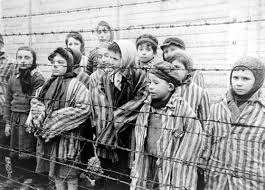
By Cian Molloy - 28 January, 2019

Children who were Auschwitz concentration camp prisoners when the camp was liberated by the Russian army 74 years ago yesterday. (Pic Wikipedia)
With each passing year, it becomes more and more imperative that we understand the importance of remembering the Holocaust and the factors that led to six million Jews being executed by the Nazi regime, said President Michael D. Higgins at an event in Dublin’s Mansion House marking the 74th anniversary of the liberation of Auschwitz.
Among those present at the event were three Holocaust survivors, Suzi Diamond, Tomi Reichental and Walter Sekules, as well as Jadzia Kaminska, representing her father Jan, who is the fourth Holocaust survivor living in Ireland. Also gathered in the Mansion House were second- and third-generation survivors. The President told them they were “critical in helping us to bear witness to a dark and tragic chapter of the past”.
Between 1940 and 1945, in Auschwitz alone more than a million people were systematically murdered, with President Higgins noting that while the victims were predominantly Jews, they also included Communists, homosexuals, Romani people and trade unionists.
One reason why it is important to remember the Holocaust is that there is “a growing rise of various forms of corrupted and distorted nationalism on virtually every continent”, said the President. “Countries across Europe have seen a rise in electoral support for political parties declaiming an extreme, exclusionary message. Refugees, immigrant communities and other minority groups are increasingly viewed as a threat to the rights of the majority and many achievements by those who have fought tirelessly for human rights are under threat by a new generation of extremists who view those universal rights as a threat to their own individual rights. The poison of anti-Semitism is not absent from their rhetoric.
“These new tendencies took a strong hold during the recession of recent years when many felt the impact of austerity, and it became all too easy, for many, to scapegoat migrants and refugees and to present them as jeopardising the job prospects of ‘native citizens’. However, despite the decline of unemployment and a gradual economic recovery, a corrupted form of populism has not abated, and anti-Semitism has not been eliminated from the extreme rhetoric of those seeking to scapegoat the vulnerable [and] inflame the confused and angry.”
Looking back at “the huge stain on human history that was the Holocaust”, President Higgins said it was possible to identify the separate stages that culminated in the mass murder of six million Jewish people.
“We can see how racism and resentment of those perceived as ‘other’ can lead to discrimination; how discrimination can lead to isolation and persecution; how isolation and persecution can lead to the viewing of one group of fellow citizens as being less than human and how that loss of any sense of shared humanity can lead to brutality, barbarity and a most inhuman lack of mercy, informed by a learned culture of humiliation of the ‘other’ and, in the case of the Holocaust, their elimination.”
However, on a positive note, the President said: “We know now that it is much easier through global communications to anticipate and to prevent genocide if we intervene in those earlier stages of discrimination and persecution.”
He added: “As anti-Semitism and racism once again begin to rise across Europe we must remember the Holocaust collectively and work together to ensure that hatred and inhumanity [are] not allowed to once again spread [their] dark shadow across Europe and the world.
“On this Holocaust Memorial Day and at a time when democracy is once again being challenged by populist leaders, let us commit to remembering the atrocities of the Holocaust and the intolerance, prejudice and denial of the dignity and rights of the ‘other’ which had led to it.
“Let us commit to ensuring that all those who lost their lives in Auschwitz, in Bergen Belsen, in Dachau and in all the other concentration camps where minority groups were confined will not be forgotten now or into the future. As we remember, let us also ensure that we do not become passive observers of discrimination or inequality in our society but remain vigilant to the emergence of racism and hate speech, [and] continue to share a common obligation to value and uphold human dignity, freedom, equality and democracy.”